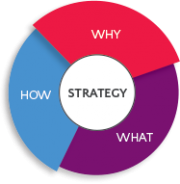
Strategy is about setting a goal (the 'what') and identifying the means to get there (the 'how').
BUT: The most important part of strategy is the 'WHY'.

To achieve a successful outcome, staff at all levels need to understand and buy-into the direction of travel. This requires clarity, explanation, motivation, inspiration and all-encompassing consultation.
Present-Future excels in this. By focussing on the importance of purpose and always foregrounding the ‘why’, we provide a platform for inclusion and creativity at all levels.
What you get
What you get
Creative left- and right-brain thinking:
- Keen attention and curiosity to ensure understanding of your needs
- Refusal to be constrained by conventional thinking and rote problem-solving
- A wide and inclusive lens through which any situation can be viewed
- Ambitious and achievable outcomes
Expertise gleaned from experience and from access to a wide community of executive strategists:
- Proven success developing business models that produce the most felicitous outcomes
- Astuteness and agility at choosing partners, conducting due diligence, and negotiating partnership arrangements that serve all parties
- Outstanding success in tendering for and winning business
- Expertise implementing new business models and newly won contracts
Clear analyses and recommendations:
- In-depth analyses using a variety of tailored strategic tools from a wide toolbox
- Collaborative and consultative conversations to identify whether the practical application of defined strategy is workable and to adjust where necessary
- Flexibility in designing strategic plans to accommodate continuous improvement and sustainability.
- Clear plans for culture change and on-boarding of all directors and employees
How it helps
How it helps
Supports integrated governance and synergy between business units and partners:
- Clear processes and inclusive communication ensures coherence, comprehensive buy-in and efficiency
Reveals opportunities for development and expansion:
- Strategic analyses and curiosity intently deployed to understand your direction of travel identifies the most appropriate means to achieve your ambitions
Formulates short- medium- and long-term plans for success:
- A focus on flexibility and sustainability provides solutions that address immediate needs and future opportunities
Provides clear direction:
- Attention to clarity of vision and inclusive communication ensures coherence
- Recommendations outline clear processes and means of achieving aims
- Strategic analysis and planning
- Business and service model design
- Bid-writing … and winning!
- Partnership and commissioner negotiations
- Complex contract and project implementation
- Business development
- Change management
- Efficiency savings
- Governance expertise
- Specialism in Health and Social Care and Criminal Justice
- CQC and CSSIW competence
- Quality improvement
- Research and development
- Conference presentations
- Supporting a new charity to develop a strategic plan and prioritise actions
- Teaching strategy and management to students at Oxford University colleges
- Delivering lectures and seminars in Leadership and Management as associate lecturer at Oxford Brookes University
Voluntary work: As Chair of the Board of Trustees, and Chair of the Governance Committee for Broadway Lodge, a treatment centre for addiction, Caroline leads the strategic direction and overarching planning in line with the mission and vision, and ensures compliance with all CQC and CSSIW requirements for delivering a high quality service.
- 2006: Ministry of Justice Award for 'the Best CARAT team in the UK'.
- 2014: The Journal of Criminal Psychology editorial team award for the 'Outstanding Paper of 2014'.
- Disbury, K. L., Kopak, A. M., Dean, L. V., Moyes, H. C. A., Breedvelt, J. J. F., Thibaut, B. I., Cole, C., Heath, J. J. (Forthcoming September 2016) ‘Pre to post differences in measures of risk of relapse and reoffending for completers of RAPt’s 6-week programmes.’ Journal of Offender Rehabilitation.
- Breedvelt, J. J. F., Dean, L. V., Jones, G. Y., Cole, C., & Moyes, H. C. A. (2014) ‘Predicting recidivism for offenders in UK substance dependence treatment; Do mental Health symptoms matter?’ Journal of Criminal Psychology, 4(2), 102-115.
- Cole, C. (2012) ‘Substance Abuse’ (ed.) Greenfields, M., Dalrymple, R., Fanning, A. Working with Adults at Risk from Harm, 131-156.


Comments are closed.